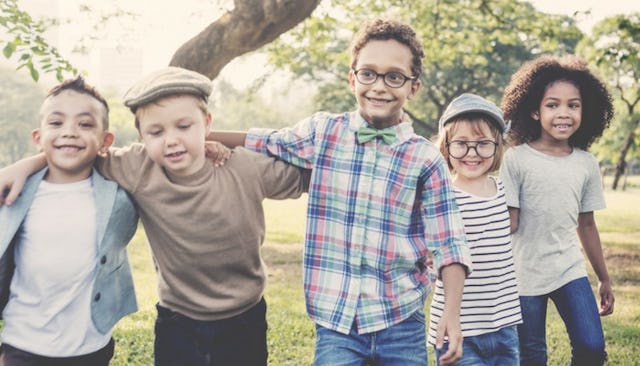How To Raise Forward-Thinking Children

Parenting is political. This is a truth I firmly believe. As a mother, I spend all of my time being careful to model the exact kind of behavior I want to instill in my kids. Of course, being human means I screw up sometimes and do stupid things like anyone else, but overall, the consistent message I am sending my children is simple: You are a steward of your community, and you must do everything you can to make it a safe and great place to live.
I am intentionally raising my children to be active stewards of social justice, because as a feminist and modern citizen, that is my greatest obligation. I’m still learning that we are all a work in progress, but this is what I’ve got so far:
1. Teach them compassion.
Children will understand compassion when they see it modeled for them. Compassion is showing kids empathy and love by making sure they understand that their feelings, as well as the feelings of others, are important. Using kindness as a rule to guide the words we choose and the actions we take — especially when we are feeling undervalued or angry — is vital.
2. Teach them to use their voice.
Kids have voices too, and they need to understand and be given opportunities to express those voices along with their wants and needs. My husband and I do not talk down to our children or infantilize our language; we talk to them like people we truly respect. As a result, they have impressive vocabularies — not just everyday language but emotional language as well. They are confident enough to express their feelings in various situations so that their needs (or the needs of others) can be met.
3. Teach them how to resolve conflicts.
All kids fight, and all siblings fight. That is an annoying and inconvenient truth. But we can use those times as opportunities to teach children valuable life skills. When kids can learn how to use empathy, cope with their anger, be accountable for their actions, and talk their way through a problem, then we are teaching them coping mechanisms they will carry through life. Healthy, nonviolent conflict resolution — I think we can all agree this is essential.
4. Teach them to respect their environment.
Earth is not flat, dinosaurs existed, and humans are ruining this planet. For me, these are indisputable facts, and my kids are learning at a very young age to reduce, reuse, and recycle. They know the importance of conservation and not wasting water or energy. They are also learning about the environment we live in — our everyday surroundings — so they can appreciate and respect nature, wildlife, and community members.
5. Teach them to get involved.
We volunteer. Everyone should. Getting kids involved with local volunteerism, both big and small, is a fantastic way to show them that their place in their community matters and their actions can affect others in meaningful ways. Figure out what sparks their interest, whether it is community cleanup or serving meals at a local soup kitchen.
6. Teach them who our leaders are.
No kid is ever too young to learn about politics. Just like sex, guns, drugs, and other important real-world issues, there’s an appropriate way to broach these topics with our children, depending on their age, maturity level, etc. Get a copy of Schoolhouse Rock! and show your kids some lessons on what voting is, how America was born, and how a bill becomes a law. Go visit your state capital and explain what the governor does. Do whatever you can to teach your kids about civics so that they grow up understanding and appreciating that they live in a democracy.
7. Teach them equality.
Don’t just teach them that pink and blue are not a competing faction, also teach them that true equality — true feminism — is about equal access for everyone. All people need access to medicine, food, protection, education, shelter, and safety. Teach them that while everyone is different, those differences are what make people so damn interesting and beautiful. No matter how different people are, everyone deserves to be treated with compassion, respect, and the same rights.
It’s also essential to discuss white privilege: what it means, how it affects society, and how we must work to dismantle systemic racism so that our democracy and justice system isn’t oppressing people of color.
Children are our future. It is our job to give them the right tools — along with the time and patience to practice using those tools — in order to become productive, compassionate, and engaged adults. If we want to save our planet, foster equality in our communities, and have a more peaceful nation (world!), then we must start at home.
Empowered, kind children become empowered, kind adults. Let’s do this.